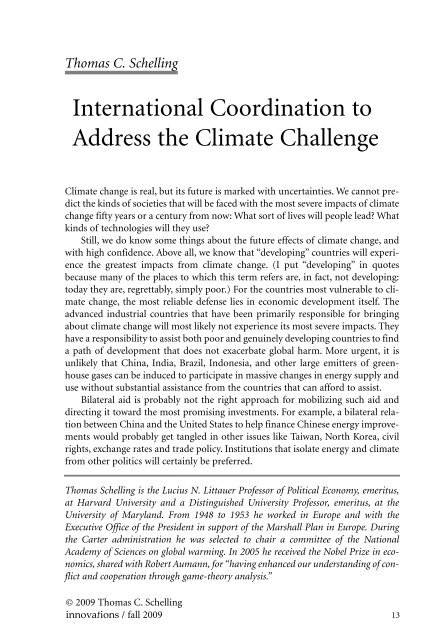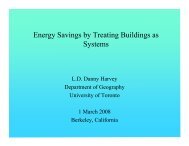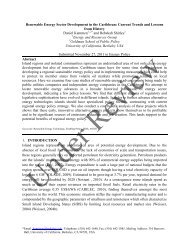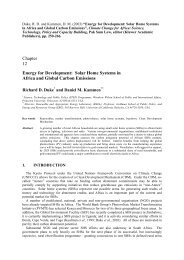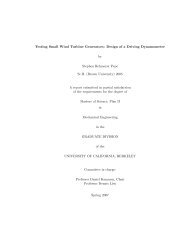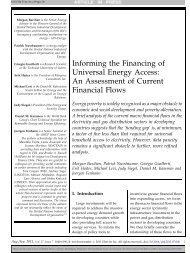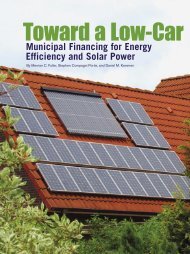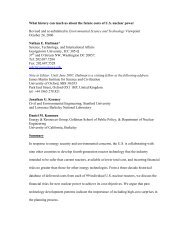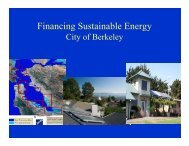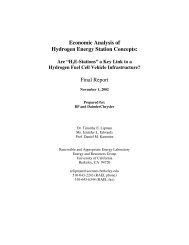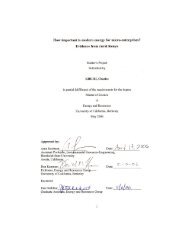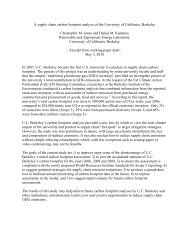- Page 1 and 2: volume 4 | issue 4 | fall 2009 A qu
- Page 3 and 4: innovations TECHNOLOGY | GOVERNANCE
- Page 5 and 6: John P. Holdren Energy for Change I
- Page 7 and 8: Introduction to the Special Issue o
- Page 9 and 10: Introduction to the Special Issue o
- Page 11 and 12: Introduction to the Special Issue o
- Page 13: Introduction to the Special Issue o
- Page 17 and 18: Thomas C. Schelling domestic produc
- Page 19 and 20: Thomas C. Schelling I can’t think
- Page 21 and 22: Thomas C. Schelling countries had t
- Page 23 and 24: Vinod Khosla Whose Rules? Terms of
- Page 25 and 26: Whose Rules? Total Annual Carbon Di
- Page 27 and 28: Whose Rules? per-capita GDP as the
- Page 29 and 30: Whose Rules? Forecasting is an inex
- Page 31 and 32: Whose Rules? 1) It is an outlier be
- Page 33 and 34: Whose Rules? world can reduce its c
- Page 35 and 36: Whose Rules? oped nations working t
- Page 37 and 38: Whose Rules? Figure 6. Hypothetical
- Page 39 and 40: Whose Rules? ing cost of events rel
- Page 41 and 42: Eileen Claussen Deploying Our Clean
- Page 43 and 44: Deploying Our Clean Energy Future i
- Page 45 and 46: Deploying Our Clean Energy Future C
- Page 47 and 48: Deploying Our Clean Energy Future b
- Page 49 and 50: Bill Drayton People, Not Things Whe
- Page 51 and 52: People, Not Things Imagine what wou
- Page 53 and 54: People, Not Things • It gives eve
- Page 55 and 56: People, Not Things vation and inves
- Page 57 and 58: Arthur H. Rosenfeld with Deborah Po
- Page 59 and 60: Arthur H. Rosenfeld with Deborah Po
- Page 61 and 62: Arthur H. Rosenfeld with Deborah Po
- Page 63 and 64: Arthur H. Rosenfeld with Deborah Po
- Page 65 and 66:
Arthur H. Rosenfeld with Deborah Po
- Page 67 and 68:
Arthur H. Rosenfeld with Deborah Po
- Page 69 and 70:
Arthur H. Rosenfeld with Deborah Po
- Page 71 and 72:
Arthur H. Rosenfeld with Deborah Po
- Page 73 and 74:
Arthur H. Rosenfeld with Deborah Po
- Page 75 and 76:
Arthur H. Rosenfeld with Deborah Po
- Page 77 and 78:
Arthur H. Rosenfeld with Deborah Po
- Page 79 and 80:
Ralph Cavanagh Graphs, Words and De
- Page 81 and 82:
Graphs, Words and Deeds years (from
- Page 83 and 84:
Graphs, Words and Deeds part on the
- Page 85 and 86:
Graphs, Words and Deeds claims that
- Page 87 and 88:
Graphs, Words and Deeds natural-gas
- Page 89 and 90:
José Goldemberg Given this situati
- Page 91 and 92:
José Goldemberg Figure 2. Economic
- Page 93 and 94:
José Goldemberg The whole issue of
- Page 95 and 96:
José Goldemberg 70% water, which s
- Page 97 and 98:
José Goldemberg Figure 4. Reductio
- Page 99 and 100:
José Goldemberg Table 2. Subsidies
- Page 101 and 102:
José Goldemberg Table 3. Projects
- Page 103 and 104:
José Goldemberg Brazil and other t
- Page 105 and 106:
Melinda Kimble It’s Not About Eth
- Page 107 and 108:
It’s Not About Ethanol, It’s Ab
- Page 109 and 110:
It’s Not About Ethanol, It’s Ab
- Page 111 and 112:
It’s Not About Ethanol, It’s Ab
- Page 113 and 114:
It’s Not About Ethanol, It’s Ab
- Page 115 and 116:
It’s Not About Ethanol, It’s Ab
- Page 117 and 118:
It’s Not About Ethanol, It’s Ab
- Page 119 and 120:
It’s Not About Ethanol, It’s Ab
- Page 121 and 122:
Shai Agassi The macro-economic impa
- Page 123 and 124:
What kind of cars will they be? To
- Page 125 and 126:
Shai Agassi Plug-in Hybrid Electric
- Page 127 and 128:
Shai Agassi The Oil Whiplash Effect
- Page 129 and 130:
Shai Agassi Figure 1. Figure 1: Rea
- Page 131 and 132:
Shai Agassi of in the U.S., let alo
- Page 133 and 134:
Shai Agassi sign customers to long-
- Page 135 and 136:
Shai Agassi Hardly two months later
- Page 137 and 138:
Daniel M. Kammen Figure 1. Changes
- Page 139 and 140:
Frank Alix Taking out the CO 2 Powe
- Page 141 and 142:
Taking Out the CO 2 Approaches for
- Page 143 and 144:
Taking Out the CO 2 which is also p
- Page 145 and 146:
Taking Out the CO 2 the local angel
- Page 147 and 148:
Taking Out the CO 2 Table 1. Ventur
- Page 149 and 150:
Taking Out the CO 2 when we entered
- Page 151 and 152:
Taking Out the CO 2 All the members
- Page 153 and 154:
Taking Out the CO 2 ton, while the
- Page 155 and 156:
Taking Out the CO 2 Worldwide, larg
- Page 157 and 158:
Taking Out the CO 2 would be awarde
- Page 159 and 160:
Taking Out the CO 2 commercial oper
- Page 161 and 162:
M. Granger Morgan Carbon Capture an
- Page 163 and 164:
Carbon Capture and Sequestration: H
- Page 165 and 166:
Carbon Capture and Sequestration: H
- Page 167 and 168:
Matthew Bunn and Martin B. Malin Fi
- Page 169 and 170:
Matthew Bunn and Martin B. Malin op
- Page 171 and 172:
Matthew Bunn and Martin B. Malin th
- Page 173 and 174:
Matthew Bunn and Martin B. Malin re
- Page 175 and 176:
Matthew Bunn and Martin B. Malin Ob
- Page 177 and 178:
For decades to come, it will be ins
- Page 179 and 180:
Matthew Bunn and Martin B. Malin re
- Page 181 and 182:
Matthew Bunn and Martin B. Malin al
- Page 183 and 184:
Matthew Bunn and Martin B. Malin an
- Page 185 and 186:
Tariq Rauf and Zoryana Vovchok Assu
- Page 187 and 188:
Assurance of Supply and the individ
- Page 189 and 190:
Assurance of Supply in compliance w
- Page 191 and 192:
Assurance of Supply draw upon, subj
- Page 193 and 194:
Assurance of Supply March 6, 2009).
- Page 195 and 196:
The United States and other donor c
- Page 197 and 198:
Roger Howsley nuclear security sens
- Page 199 and 200:
Roger Howsley ing interest in helpi
- Page 201 and 202:
Charles McCombie vide fresh fuel an
- Page 203 and 204:
Charles McCombie ization to waste a
- Page 205 and 206:
James H. Turner, Jr., Ellen Vaughan
- Page 207 and 208:
James H. Turner, Jr., Ellen Vaughan
- Page 209 and 210:
James H. Turner, Jr., Ellen Vaughan
- Page 211 and 212:
James H. Turner, Jr., Ellen Vaughan
- Page 213 and 214:
James H. Turner, Jr., Ellen Vaughan
- Page 215 and 216:
James H. Turner, Jr., Ellen Vaughan
- Page 217 and 218:
James H. Turner, Jr., Ellen Vaughan
- Page 219 and 220:
James H. Turner, Jr., Ellen Vaughan
- Page 221 and 222:
James H. Turner, Jr., Ellen Vaughan
- Page 223 and 224:
James H. Turner, Jr., Ellen Vaughan
- Page 225 and 226:
Henry L. Green High-Performance Bui
- Page 227 and 228:
High-Performance Buildings their oc
- Page 229 and 230:
High-Performance Buildings and comp
- Page 231 and 232:
Franz Beyeler, Nick Beglinger and U
- Page 233 and 234:
Franz Beyeler, Nick Beglinger and U
- Page 235 and 236:
L. Hunter Lovins Figure 1. A Cost C
- Page 237 and 238:
L. Hunter Lovins Figure 2. Californ
- Page 239 and 240:
L. Hunter Lovins The Business Case
- Page 241 and 242:
L. Hunter Lovins Interface Inc. Whe
- Page 243 and 244:
L. Hunter Lovins Figure 4. Performa
- Page 245 and 246:
L. Hunter Lovins world, is not maki
- Page 247 and 248:
L. Hunter Lovins host of other reas
- Page 249 and 250:
L. Hunter Lovins Arnold Schwarzeneg
- Page 251 and 252:
L. Hunter Lovins also pledged to in
- Page 253 and 254:
L. Hunter Lovins In September 2007,
- Page 255 and 256:
L. Hunter Lovins web-based learning
- Page 257 and 258:
L. Hunter Lovins scheme. Under Gove
- Page 259 and 260:
L. Hunter Lovins joined the call by
- Page 261 and 262:
L. Hunter Lovins ly want is the ser
- Page 263 and 264:
L. Hunter Lovins The Reverend Sally
- Page 265 and 266:
L. Hunter Lovins Making an informed
- Page 267 and 268:
L. Hunter Lovins the U.S. will add
- Page 269 and 270:
L. Hunter Lovins Figure 6. Waves of
- Page 271 and 272:
L. Hunter Lovins CONCLUSION: SEIZIN
- Page 273 and 274:
L. Hunter Lovins 21. “India Detai
- Page 275 and 276:
L. Hunter Lovins 74 In Germany, onl
- Page 277 and 278:
William B. Bonvillian and Charles W
- Page 279 and 280:
Taking Covered Wagons East to prote
- Page 281 and 282:
Taking Covered Wagons East By exten
- Page 283 and 284:
Taking Covered Wagons East a simila
- Page 285 and 286:
Taking Covered Wagons East nent tec
- Page 287 and 288:
Taking Covered Wagons East This pro
- Page 289 and 290:
Felix S. Creutzig and Daniel M. Kam
- Page 291 and 292:
The Post-Copenhagen Roadmap towards
- Page 293 and 294:
The Post-Copenhagen Roadmap towards
- Page 295 and 296:
The Post-Copenhagen Roadmap towards
- Page 297 and 298:
The Post-Copenhagen Roadmap towards
- Page 299 and 300:
The Post-Copenhagen Roadmap towards
- Page 301 and 302:
The Post-Copenhagen Roadmap towards
- Page 303 and 304:
The Post-Copenhagen Roadmap towards
- Page 305 and 306:
The Post-Copenhagen Roadmap towards
- Page 307 and 308:
The Post-Copenhagen Roadmap towards
- Page 309 and 310:
The Post-Copenhagen Roadmap towards
- Page 311:
innovations TECHNOLOGY | GOVERNANCE


